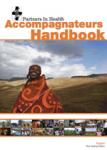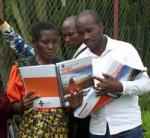Partner in Health Update: PIH Model Site Launched / 60 Minutes to Feature PIH
 With its emphasis on human rights, social justice and empowerment, Partners in Health (PIH) is making a difference in Haiti, Peru, Guatemala, Mexico, Russia, Lesotho and even Boston. PIH has inspired individuals working for non governmental organizations, international organizations and even governments to better serve the poor. PIH Model Online (PIHMO) was recently created as a practical online resource for anyone delivering health services in resource-poor settings. David West, part of the PIHMO team, notes that while the project is just in its early stages, there will be a flood of useful content in the coming year. The website will also provide a forum for discussion on health, human rights and poverty.
With its emphasis on human rights, social justice and empowerment, Partners in Health (PIH) is making a difference in Haiti, Peru, Guatemala, Mexico, Russia, Lesotho and even Boston. PIH has inspired individuals working for non governmental organizations, international organizations and even governments to better serve the poor. PIH Model Online (PIHMO) was recently created as a practical online resource for anyone delivering health services in resource-poor settings. David West, part of the PIHMO team, notes that while the project is just in its early stages, there will be a flood of useful content in the coming year. The website will also provide a forum for discussion on health, human rights and poverty.
 In brief, PIH has three goals: (1) to care for patients; (2) to alleviate the root causes of disease in their communities; and (3) to share lessons learned around the world. The website was created to advance the third goal and contains information on:
In brief, PIH has three goals: (1) to care for patients; (2) to alleviate the root causes of disease in their communities; and (3) to share lessons learned around the world. The website was created to advance the third goal and contains information on:
Community Health Workers: Outlines the importance of community-based care and the role of accompagnateurs (a.k.a. community health workers), including details on recruitment, training, and supervision.
Food and Nutrition: Outlines efforts to target food assistance to HIV and TB patients and their families, treat malnourished children, and prevent HIV transmission from mother to child through the provision of infant formula.
Procurement: Outlines how to assess needs and resources for medicines, supplies, and equipment; build infrastructure and staff; and acquire and manage stock.
Soon there will also be information on PIH’s electronic medical records system and program management principles.
 In terms of training materials, you can also find a pilot edition of their training curriculum for community health workers including flipcharts and powerpoint presentations. There is also a guide to community based treatment of HIV in resource poor settings. Soon, a guide on treating multi-drug resistant TB (officially adopted the the Lesotho Ministry of Health) will be available as well. Whenever possible, resources will be provided in English and French.
In terms of training materials, you can also find a pilot edition of their training curriculum for community health workers including flipcharts and powerpoint presentations. There is also a guide to community based treatment of HIV in resource poor settings. Soon, a guide on treating multi-drug resistant TB (officially adopted the the Lesotho Ministry of Health) will be available as well. Whenever possible, resources will be provided in English and French.
 The PIHMO Team states "For any and all of these materials, we welcome your general or specific feedback—whether sharing your own programmatic experiences, suggesting additional information for inclusion, or requesting further clarification. We thank you in advance for joining with us to improve the delivery of high-quality health care to the world’s poorest communities through the sharing of information and experience. We look forward to hearing from you."
The PIHMO Team states "For any and all of these materials, we welcome your general or specific feedback—whether sharing your own programmatic experiences, suggesting additional information for inclusion, or requesting further clarification. We thank you in advance for joining with us to improve the delivery of high-quality health care to the world’s poorest communities through the sharing of information and experience. We look forward to hearing from you."
 Finally, on May 4th at 7:00 PM, you can catch a 60 minutes broadcast that will highlight interviews and action footage filmed during a week in Haiti and several visits to Boston. This is an excellent opportunity for you to support PIH by getting the word about their approach, their work, and the impact it is having throughout the world. PIH notes how you can help below:
Finally, on May 4th at 7:00 PM, you can catch a 60 minutes broadcast that will highlight interviews and action footage filmed during a week in Haiti and several visits to Boston. This is an excellent opportunity for you to support PIH by getting the word about their approach, their work, and the impact it is having throughout the world. PIH notes how you can help below:
1) Inform people you know who might be (or ought to be) interested
2) Email the date and time of the broadcast to your friends or download a postcard you can print and post or circulate as an email attachment.
3) Host a 60 Minutes viewing party Invite friends, relatives and anyone else you think might be interested to watch the show and to share some light refreshments and lively discussion.
4) Check out a recent series of articles and short videos about PIH's work in Haiti on the Harvard website.
5) Visit and bookmark the websites of the Institute for Justice and Democracy in Haiti and HaitiAnalysis.com for news and analysis about Haiti's current food crisis and centuries-old struggle for justice.
6) Subscribe to the PIH e-Bulletin to receive monthly updates on our work
7) Donate to PIH and encourage others to follow your example. It takes less than a minute to make a secure online donation.
It is always easier to criticize than to innovate. First, PIH was told they could not do what they hoped to accomplish in low resource settings. When they succeeded, they were told they could not replicate it. When they replicated, they were told it could not be sustained. But PIH continues to expand and sustain their programs admirably - and the world is healthier and more just for their efforts. Haiti Innovation congratulates PIH on all they have been able to accomplish.
Bryan
Add new comment